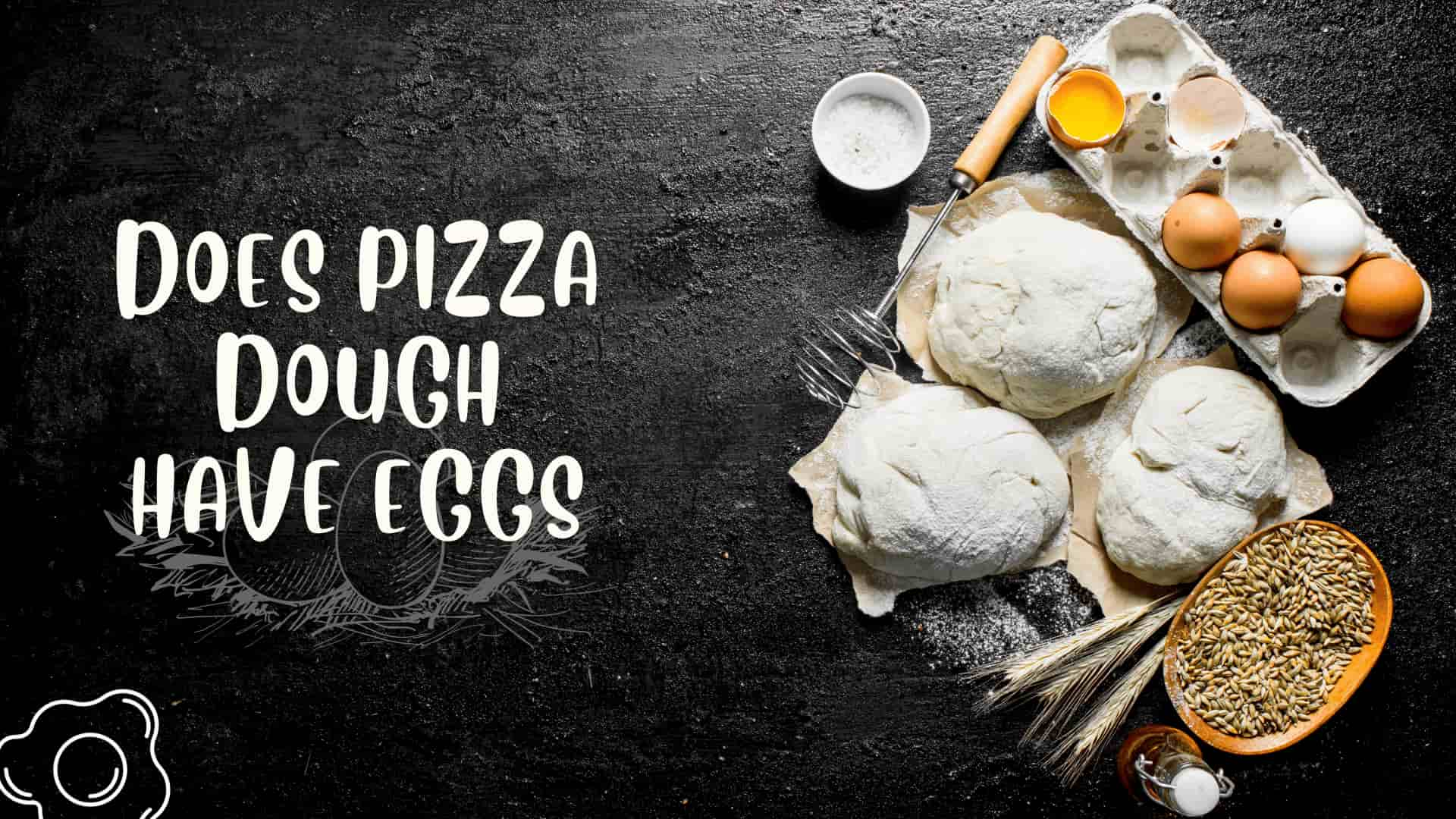Pizza dough traditionally does not contain eggs, consisting of basic ingredients like flour, water, yeast, salt, and olive oil. However, variations of pizza dough recipes may include eggs for a richer texture and flavor.
Table of Contents
The Tradition:
The traditional pizza crust, particularly when considering classic Italian or Neapolitan pizza, does not contain eggs. The basic ingredients are:
- Flour
- Water
- Yeast (either fresh or dry)
- Salt
- Olive oil (in some recipes)
This combination yields a light, airy, and crisp crust when baked at high temperatures. The simplicity of the ingredients allows the flavors of the toppings to shine through.
Why Add Eggs to Pizza Dough?
While not traditional, some recipes do include eggs in pizza dough. But why?

- Richness & Flavor: Eggs can add a rich flavor to the crust, giving it a slightly different taste profile than traditional dough.
- Texture: Eggs can make the dough slightly more tender and can provide a different mouthfeel.
- Structure & Stability: The proteins in eggs can give the dough added structure, making it sturdier. This can be particularly useful for pizzas with heavy or wet toppings.
- Color: Eggs can impart a golden hue to the crust, especially if an egg wash is applied to the outer crust before baking.
Modern Pizza Dough Recipes:
In recent years, some pizza dough recipes have started to include eggs. These recipes often call for a single egg yolk or a whole egg to be added to the dough mixture. The addition of eggs serves several purposes:
- Richness: Eggs contribute to the overall richness and flavor of the dough, making it more complex and satisfying.
- Tenderness: Eggs help to create a tender crumb, which is especially important in modern pizza styles that emphasize a softer, chewier crust.
- Structure: Eggs provide additional structure to the dough, helping it hold its shape and maintain a consistent texture throughout the cooking process
Variations of Egg-Containing Dough
- Gluten free Pizza Dough: Many recipes incorporate eggs. Eggs can help bind the dough, providing a structure that’s sometimes lacking in gluten-free flour mixes.
- Deep-dish or Chicago-style Pizza: Some recipes for deep-dish pizza dough include eggs, contributing to the crust’s distinct texture and richness.
- Dessert Pizzas: In recipes where the crust is meant to be more pastry-like or biscuit-like, eggs might be added to achieve the desired texture and flavor.
Egg Allergies & Dietary Restrictions
For individuals with egg allergies or certain dietary restrictions, it’s crucial to read pizza dough ingredient lists when purchasing pre-made dough or when dining out. While most traditional pizza doughs won’t contain eggs, there’s no harm in asking and being sure, especially since some specialty or non-traditional pizzas might.
Disadvantages of eggs in pizza dough
Using eggs in pizza dough can provide a unique flavor, texture, and color, but there are also several potential disadvantages to consider. Here’s a breakdown of the drawbacks of incorporating eggs into pizza dough:
- Altered Traditional Taste and Texture: The classic pizza crust, particularly Neapolitan-style, is known for its crisp exterior and soft, chewy interior. Adding eggs can change this dynamic, potentially resulting in a crust that is denser or more cake-like, which might not appeal to pizza traditionalists.
- Shorter Shelf Life: Eggs can reduce the shelf life of pizza dough. The fats in the eggs can go rancid if stored for extended periods, and there’s also a potential risk of bacterial growth, especially if the dough is kept at room temperature for too long.
- Dietary Restrictions and Allergies: Eggs are a common allergen. Using them in pizza dough can make the dish unsuitable for individuals with egg allergies. Additionally, vegans do not consume eggs, so an egg-based pizza dough would not be appropriate for those following a vegan diet.
- Consistency Challenges: Eggs can make the dough more sticky and challenging to handle, especially when rolling or stretching. This can be particularly problematic for those unfamiliar with the modified texture.
- Potential for Overcooking: Since eggs are set as they cook, there’s a risk of overcooking the pizza crust, leading to a drier, tougher result.
- Cost Implications: While eggs aren’t typically the most expensive ingredient, adding them to every batch of dough can increase the overall cost of making pizza, especially in commercial settings where large quantities are produced.
- Balancing Moisture: Eggs add moisture to the dough. This can require adjustments to cooking times or temperatures to ensure the crust isn’t soggy. It may also necessitate changes to other ingredient quantities to maintain the right dough consistency.
- Overpowering Flavor: Eggs have a distinct taste. In some instances, especially if too many eggs are used, they can overpower the flavors of the toppings and the inherent taste of the dough, making the egg flavor prominent.
- Color Variations: Eggs can give the dough a more yellowish hue, which might not be desired, especially if aiming for a classic pale golden crust.
- Limited Crispiness: For those who enjoy a crispy crust, adding eggs can make achieving that desired texture more challenging. The crust might not crisp up as effectively, especially in home ovens that can’t reach the high temperatures of commercial pizza ovens.
In conclusion, while eggs can offer certain advantages to pizza dough in terms of richness and structure, they also come with several potential downsides. Bakers and chefs should weigh these considerations carefully based on their desired end product and the preferences of their audience.
Which dough is good for diet-conscious people?
When it comes to pizza dough that’s suitable for diet-conscious individuals or those aiming to achieve specific health goals, it’s essential to consider the nutritional content and overall benefits of the dough. Here’s a rundown of some dough options that cater to various dietary needs:
- Whole Wheat Dough
- Cauliflower Dough
- Almond Flour or Coconut Flour Dough
- Spelt Dough
- Gluten-Free Dough
- Protein-Enriched Dough
- Chickpea (Socca) Dough
When selecting or making a pizza dough, diet-conscious individuals should consider their specific dietary needs, whether they’re aiming for reduced calories, lower carbs, higher protein, or other nutritional goals. It’s also essential to consider the toppings, as they play a significant role in the overall nutritional profile of the pizza. Opting for various vegetables, lean proteins, and moderate amounts of cheese can make the pizza even more diet-friendly.
[sp_easyaccordion id=”3110″]
